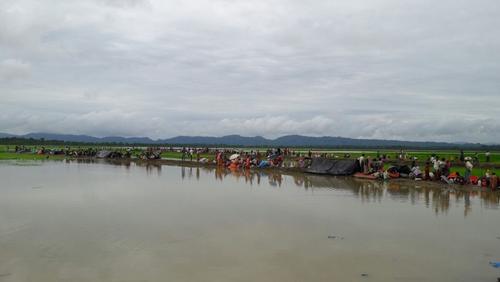Amsterdam - International humanitarian organisations must immediately be granted independent and unfettered access, including for international staff, to alleviate massive humanitarian needs in Rakhine State, Myanmar.
MSF’s call for urgent access comes amid the ongoing military operations in Rakhine, which started on 25 August after a new spate of attacks against police stations and a military base claimed by the Arakan Rohingya Salvation Army (ARSA). As a consequence, more than 400,000 Rohingya have fled to Bangladesh and are living in extremely precarious conditions with limited access to health care, drinking water, latrines and food.
The remaining population in Northern Rakhine, thought to be hundreds of thousands of people, is without any meaningful form of humanitarian assistance.
“Our teams in Bangladesh are hearing alarming stories of severe violence against civilians in Northern Rakhine,” says Karline Kleijer, MSF emergency desk manager. “Reports says there is significant internal displacement of Rohingya, ethnic Rakhine populations and other minorities. Villages and houses have been burned down, including at least two out of four of MSF’s clinics.”
“MSF was providing healthcare services in Maungdaw and Buthidaung townships in Northern Rakhine before they were put on hold due to a lack of travel authorisation and a ban on international staff in mid-August”, Ms Kleijer said. “We fear that the people remaining there are unable to access the help they may need. Injured, sick or chronically ill people in Northern Rakhine must be accessed without further delay, while emergency healthcare and other humanitarian assistance should be provided.”
In Central Rakhine, approximately 120,000 internally displaced people remain in camps where they are entirely dependent on humanitarian assistance for their survival, due to severe movement restrictions. MSF used to provide mobile clinics in several camps and villages for displaced people, but international staff have not been granted travel authorisations to visit the health facilities since August, whilst national staff have been too afraid to go to work following remarks by Myanmar officials accusing NGOs of colluding with ARSA.
The government-formulated and disseminated accusations against the UN and international NGOs, denial of required travel and activity authorisations, and threatening statements and actions by hardline groups, are all preventing independent humanitarian workers from providing much-needed assistance. Moreover Northern Rakhine has been declared a military zone by the government of Myanmar, resulting in even more severe administrative and access constraints.
The government of Myanmar says it wants to exclusively implement the humanitarian response to those affected in Rakhine, sparking fears that aid might not reach those who most need it.

“This suggests Myanmar is moving towards a new modus operandi putting the delivery of humanitarian aid under the government’s exclusive control, which is likely to result in even more severe administrative and access constraints than ever,” says Benoit De Gryse, MSF’s operations manager for Myanmar. “The only way to ensure aid is provided based on needs and is trusted by all populations, is for it to be provided by independent neutral humanitarian actors.”
MSF is alarmed by the current lack of access to healthcare for those remaining in Rakhine. When it has full access to its clinics, MSF provides over 11,000 primary and reproductive healthcare consultations per month, as well as emergency transport and assistance for patients requiring hospitalisation. All these services are currently on hold, and other agencies have also reported being unable to carry out their activities in Rakhine due to lack of access.
“To ensure access to medical care and to be able to provide assistance to conflict-affected people, MSF and other international humanitarian agencies must be allowed immediate and unhindered access to all areas of Rakhine State. Without this, there is a very real risk that patients will die unnecessarily,” says De Gryse.
MSF’s medical projects in other areas of Myanmar; namely Shan and Kachin states and Yangon and Thanintharyi, continue to operate as usual. MSF’s regular projects include HIV, tuberculosis, primary healthcare, sexual and reproductive healthcare, emergency referrals to public hospitals and malaria treatment.
MSF has worked in Myanmar for 25 years, working with the Ministry of Health and Sports to provide care for HIV and TB patients, primary healthcare, and vaccinations.
In Rakhine State, Myanmar, MSF usually operates mobile clinics providing primary healthcare consultations in a number of villages and displaced population camps, and organising emergency medical referrals to MoHS hospitals. MSF also usually supports the provision of HIV treatment in MoHS hospitals in Northern Rakhine. In Central Rakhine, MSF also usually treats TB patients in cooperation with the National TB programme. Until mid-August, MSF was providing healthcare services in Pauktaw, Sittwe, Ponnagyun, Maungdaw and Buthidaung townships.


